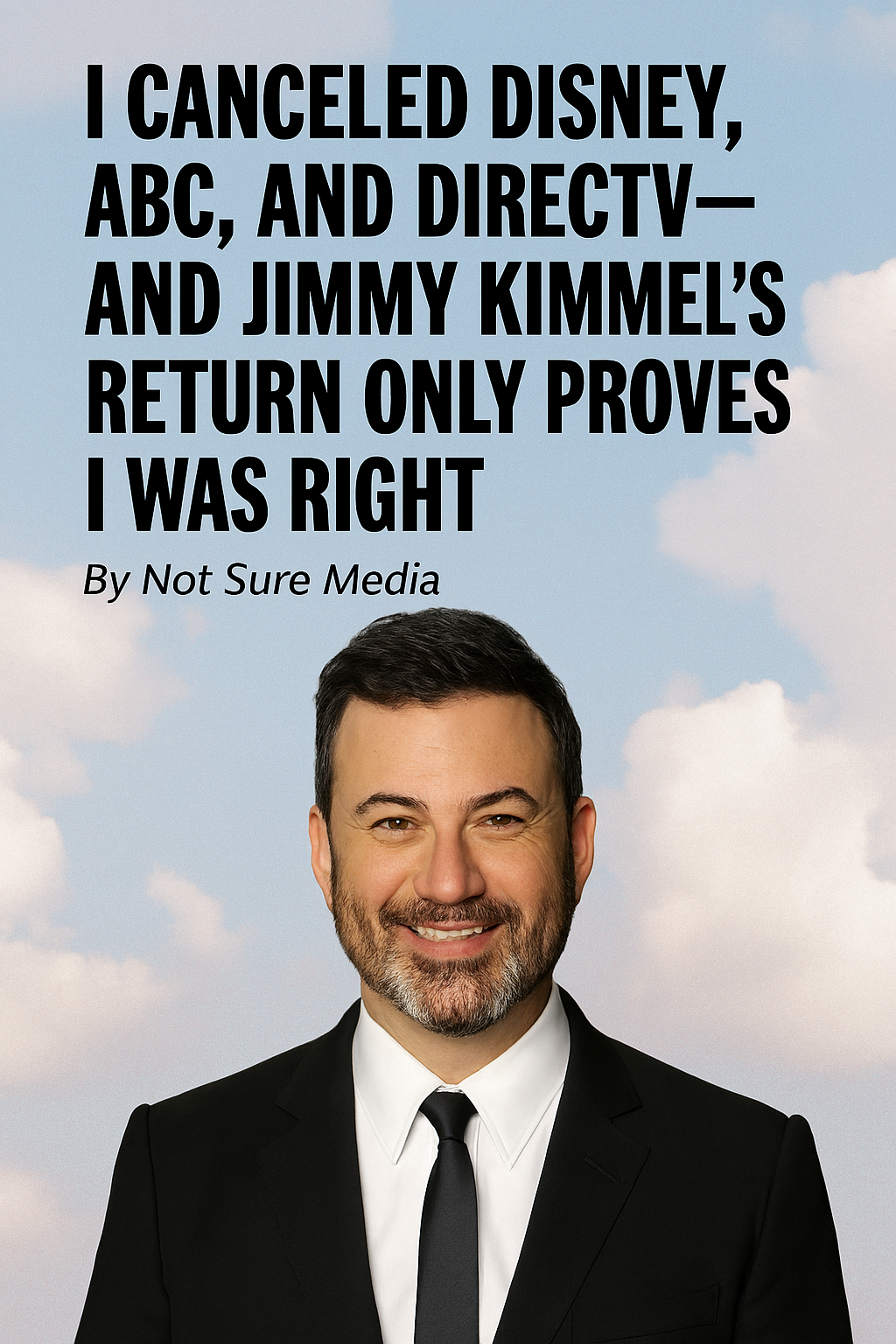“I Canceled Disney, ABC, and DIRECTV—and Jimmy Kimmel’s Return Only Proves I Was Right”
09*:00 PM PST (September 24, 2025) - N.S. EIC
It started as a quiet rebellion. A few clicks. A few cancellations. DIRECTV, gone. ABC affiliates, blocked. Disney+, Hulu, scrubbed from every device. Not because of one show, but because of what the whole machine had become: a feedback loop of outrage, manipulation, and commercial hypnosis. And then Disney brought Jimmy Kimmel back.
That was the moment I knew—I would not undo my boycott. I would not re-subscribe. I would not re-engage. Because this wasn’t just about Kimmel. It was about the system that suspended him, then reinstated him, then monetized the backlash, all while pretending to defend free speech.
Let’s recap: Jimmy Kimmel was suspended by Disney after making pointed remarks about the political exploitation of Charlie Kirk’s death. The FCC chairman, a Trump appointee, threatened investigations. ABC affiliates dropped the show. Disney panicked. Then came the backlash—from Hollywood, from viewers, from the ACLU. And just days later, Kimmel was back on air, reading a scripted joke about reactivating Disney+ accounts.
It was a masterclass in corporate doublespeak. Suspend the host to appease power. Reinstate him to appease profit. Frame it all as principled dialogue.
I didn’t cancel because of Kimmel’s joke. I canceled because the entire apparatus treats viewers like programmable wallets. Because every “controversy” is a monetization strategy. Because the same companies that throttle dissent also sell it back to us as branded resistance.
And now, without them? I walk my dogs more. I paint. I talk to humans. I remember what it’s like to think without a laugh track or a pharmaceutical ad whispering in my ear.
Some worry about the jobs lost when viewers walk away. But maybe the industry of mind games and manufactured outrage wasn’t the noble calling we thought. Maybe those skills—editing, storytelling, persuasion—belong in healthcare, education, or anywhere that doesn’t rely on manipulating grief for ratings.
Jimmy Kimmel’s return didn’t change my mind. It confirmed it. The system is intact, the cycle continues, and I’m out. Not in protest. In pursuit of something better. Something quieter. Something real.
And if I ever want to watch again? YouTube exists. But so does the sky. And right now, the sky is winning.
BREAKDOWN:
Jimmy Kimmel’s return to Jimmy Kimmel Live! after a brief suspension by Disney and ABC carries layered implications, cultural, political, and corporate. Here’s a breakdown of what it signals:
1. Free Speech vs. Corporate Risk Management
• Kimmel’s suspension followed his on-air remarks linking Charlie Kirk’s shooter to MAGA ideology, which drew criticism from the FCC chairman and conservative media.
• Disney initially pulled the show citing “ill-timed and insensitive” comments during an emotional national moment.
• His reinstatement, after negotiations with Disney brass, suggests a recalibration: the company is trying to balance political pressure with public backlash over censorship.
Implication: Corporations are increasingly caught between appeasing political power and defending creative expression. Kimmel’s return is a case study in how “free speech” gets negotiated behind closed doors.
2. Consumer Power and Economic Fallout
• Disney reportedly lost close to $5 billion in market value during the suspension week, as consumers canceled subscriptions to Disney+, Hulu, and ESPN in protest.
• The reinstatement appears driven not just by principle, but by economic necessity.
Implication: Viewers are no longer passive. Subscription cancellations and social media pressure can force billion-dollar pivots. The audience is now a stakeholder.
3. The Fragility of Late-Night Media
• Local affiliates like Sinclair and Nexstar preempted Kimmel’s show, and may still refuse to air it.
• The incident highlights how vulnerable late-night programming is to political and corporate interference.
Implication: Late-night TV, once a bastion of satire and critique, is now a battleground for ideological control. Hosts walk a tightrope between provocation and cancellation.
4. The Weaponization of Tragedy
• Kimmel’s original monologue didn’t mock Kirk’s death, it criticized the political spin surrounding it. Yet the backlash weaponized grief to silence dissent.
Implication: Tragedy is increasingly used as a rhetorical shield. Media figures who challenge dominant narratives risk being labeled insensitive, regardless of intent.
5. The Return as a Rorschach Test
Disney’s statement that “Jimmy will say what Jimmy wants to say” is both a reassurance and a warning.
• Depending on your politics, his return is either a victory for free speech or a corporate capitulation.
Implication: Kimmel’s comeback doesn’t resolve the tension, it exposes it. The culture war continues, now with ratings.
UPDATE: We have not fallen for the Disney outreach to get customers back. WE SUGGEST YOU STICK TO YOUR MORALS AND NOT RESUBSCRIBE. The only way oligarchs learn is when we cancel and never return. WE DON’T GO BACK. Otherwise, we are hypocrites. It only works if we stick to our choices. Don’t be stupid. Never subscribe to their garbage intended to manipulate how we think. Stick to it!

